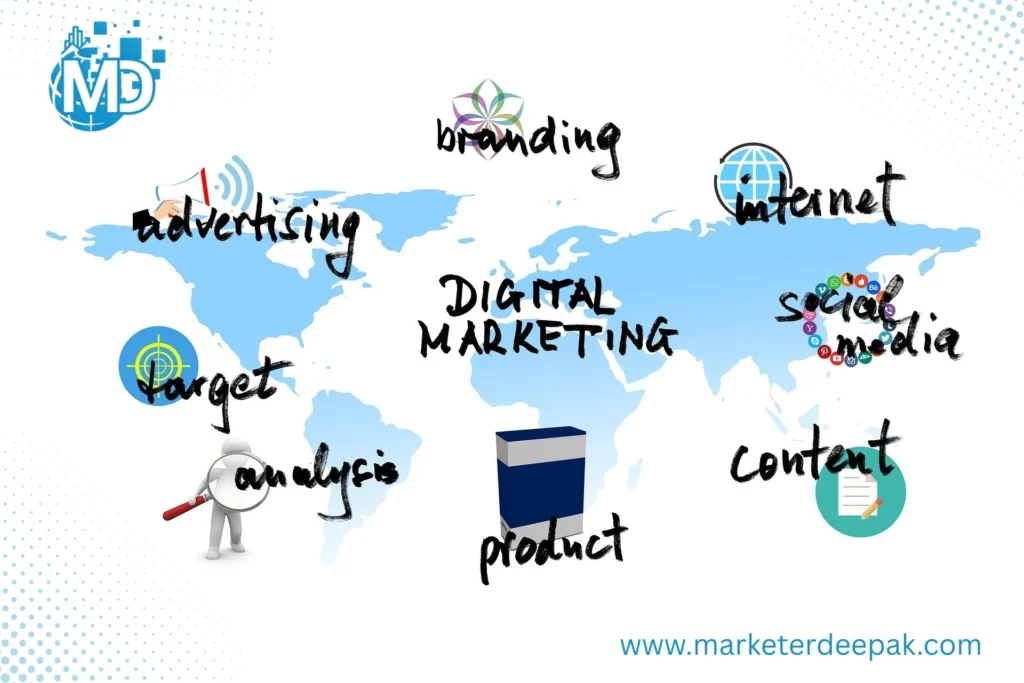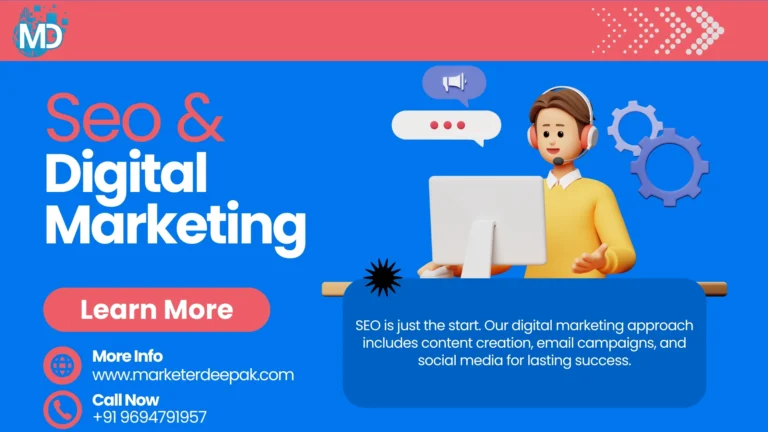Digital marketing success doesn’t have to be determined by the size of your business or its budget. Small businesses have a distinct advantage in the space.Digital marketing empowers small businesses to reach a wider audience cost-effectively. Utilize social media, SEO, and email marketing to boost visibility. Engage your audience with consistent content and data-driven strategies.
What is digital marketing for small businesses?
Digital marketing for small businesses can take many forms: social media marketing, email marketing, search engine optimisation (SEO), and much more.
When your business uses online channels and strategies to promote your products or services and engage with target audiences, you’re using digital marketing. For small businesses, this means capitalising on a cost-effective method to reach a broader audience and compete with larger competitors.

How can small businesses use SEO to help with marketing?
SEO refers to the practice of optimising a website to improve its visibility and ranking on search engine results pages (SERPs). For small businesses, SEO is invaluable as it enhances online presence, drives organic traffic, and boosts brand credibility.
One way a small business can use local SEO tactics is by improving its Google My Business listing with information such as address, phone number, and business hours, to appear in local search results. Make sure to follow up and encourage satisfied customers to leave positive reviews. A boost in credibility will improve local search rankings.
Social Media Marketing for Businesses
Social media marketing is a powerful way for businesses of all sizes to reach prospects and customers. People discover, learn about, follow, and shop from brands on social media, so if you’re not on platforms like Facebook, Instagram, and LinkedIn, you’re missing out! Great marketing on social media can bring remarkable success to your business, creating devoted brand advocates and even driving leads and sales.

What is social media marketing?
Social media marketing is a form of digital marketing that leverages the power of popular social media networks to achieve your marketing and branding goals. But it’s not just about creating business accounts and posting when you feel like it. Social media marketing requires an evolving strategy with measurable goals and includes:
- Maintaining and optimizing your profiles.
- Posting pictures, videos, stories, and live videos that represent your brand and attract a relevant audience.
- Responding to comments, shares, and likes, and monitoring your reputation.
- Following and engaging with followers, customers, and influencers to build a community around your brand.
Social media marketing also includes paid social media advertising, where you can pay to have your business appear in front of large volumes of highly targeted users.

Benefits of social media marketing
With such widespread usage and versatility, social media is one of the most effective free channels for marketing your business today. Here are some of the specific benefits of social media marketing:
- Humanize your business: Social media enables you to turn your business into an active participant in your market. Your profile, posts, and interactions with users form an approachable persona that your audience can familiarize themselves with and come to trust.
- Drive traffic: Between the link in your profile, blog post links in your posts, and your ads, social media is a top channel for increasing traffic to your website, where you can convert visitors into customers. Plus, social signals are an indirect SEO factor.
- Generate leads and customers: You can also generate leads and conversions directly on these platforms, through features like Instagram/Facebook shops, direct messaging, call-to-action buttons on profiles, and appointment booking capabilities.
- Increase brand awareness: The visual nature of social media platforms allows you to build your visual identity across vast audiences and improve brand awareness. And better brand awareness means better results with all your other campaigns.
Build relationships: These platforms open up both direct and indirect lines of communication with your followers through which you can network, gather feedback, hold discussions, and connect directly with individuals.

The essentials of a successful social media marketing strategy
A successful social media marketing strategy will look different for every business, but here are the things they will all have in common:
- Knowledge of your audience: What platforms they use, when they go on them and why, what content they like, who else they’re following, and more.
- Brand identity: What is the message you want to convey to your audience? How do you want them to feel when viewing your content?
- Content strategy: While there is a level of spontaneity on social, you’ll need a structured content strategy to be able to have a consistent voice and produce quality content regularly.
- Analytics: Quantifiable insights will inform your strategy, including who you’re reaching, the right content to share, the best times to post, and more.
- Regular activity: Social media is a real-time platform. If you want to use it to grow your business, you need to post regularly, stay on top of engagements with your business, engage back, keep up with trends, and maintain accurate profiles.
- Inbound approach: Don’t use social media to pitch your business. Focus on adding value through useful and interesting content and building up those around you.

The best social media marketing platforms for business
The best social media marketing platforms for business include Facebook, YouTube, Instagram, LinkedIn, Twitter, TikTok, and Snapchat.
Facebook-
People of a diverse range of age groups use it to communicate with friends and family, participate in groups and forums, find and visit businesses near them, and follow brands.
YouTube-
You may not think of YouTube as a social media marketing channel, but it fits the bill: you can post videos to your channel, share, comment on, and like other videos, and follow other accounts you like.
Instagram-
People use Instagram to follow influencers and brands they buy from and who support their personal values.
LinkedIn-
LinkedIn may be a professional network, but it’s also an inspiring community that celebrates leadership, learning, and core values.
Twitter-
Many people use Twitter to get news, follow brands, and get customer service. Be sure to retweet when a customer has something nice to say about you, and don’t forget to answer people’s questions when possible.
Snapchat-
Snapchat isn’t just for teens. Its largest age group (75%) ranges from 13-34, and with Snap Maps, geofilters, and its partnership with Gannett, it’s more locally-focused than you might think.
FAQ(Frequently Asked Questions)
How Important Is Digital Marketing For Small Businesses?
Digital marketing empowers small businesses to compete, connect with their audience, build credibility, and drive measurable growth across channels like SEO, social media, and email.
Why Social Media Marketing Is Important For Small Businesses?
Social media marketing builds brand awareness, connects businesses with their audience, encourages customer loyalty, and provides cost-effective ways to promote products and increase sales.
How Digital Marketing Drives Sales For Small Businesses?
Digital marketing drives sales by promoting products, tracking customer behavior, optimizing ads, and creating personalized experiences that influence buying decisions and repeat purchases.
ABOUT THE AUTHOR
DEEPAK KUMAWAT
Deepak Kumawat is a skilled freelance digital marketing expert specializing in SEO, content marketing, social media, and email strategies. He helps businesses grow and achieve impactful, long-term results online.
